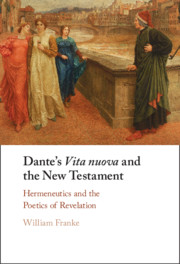Book contents
- Dante’s Vita nuova and the New Testament
- Dante’s Vita nuova and the New Testament
- Copyright page
- Contents
- Illustrations
- Prologue
- Acknowledgments
- Note on Text and Translation
- Chapter 1 Introduction: The Vita nuova as Theological Revelation through Lyrical Interpretation
- Chapter 2 The New Testament Model of Salvific Reminiscence
- Chapter 3 From Appearing and Imagining to Revealing through Interpreting: The Vita nuova’s Hermeneutics of Witness
- Chapter 4 Phenomenology versus Hermeneutics (Debate with Harrison): Revelation as Mediation
- Chapter 5 History of Effect and a New Hermeneutics-Oriented Critical Paradigm
- Chapter 6 Conclusion: The Existential Grounding of Revelation in Lyric
- Coda
- Epilogue: Dream Epistemology and Religious Revelation in Dante’s Vita nuova
- Appendix Italian Text and English Translation of the Vita nuova
- Index
Prologue
Published online by Cambridge University Press: 03 September 2021
- Dante’s Vita nuova and the New Testament
- Dante’s Vita nuova and the New Testament
- Copyright page
- Contents
- Illustrations
- Prologue
- Acknowledgments
- Note on Text and Translation
- Chapter 1 Introduction: The Vita nuova as Theological Revelation through Lyrical Interpretation
- Chapter 2 The New Testament Model of Salvific Reminiscence
- Chapter 3 From Appearing and Imagining to Revealing through Interpreting: The Vita nuova’s Hermeneutics of Witness
- Chapter 4 Phenomenology versus Hermeneutics (Debate with Harrison): Revelation as Mediation
- Chapter 5 History of Effect and a New Hermeneutics-Oriented Critical Paradigm
- Chapter 6 Conclusion: The Existential Grounding of Revelation in Lyric
- Coda
- Epilogue: Dream Epistemology and Religious Revelation in Dante’s Vita nuova
- Appendix Italian Text and English Translation of the Vita nuova
- Index
Summary
Moving from the recently changed landscape in literary theory, in which the distinction between sacred and secular literature blurs, this book demonstrates that Dante’s Vita nuova harbors enormous potential for responding creatively to the cultural and intellectual crises of our times. Our “post-truth” era can rediscover the deeper meaning of truth as a poetic interpretation of what in the Middle Ages could still be understood as theological revelation. Dante’s “little book” makes startlingly clear how theology is crucial to the continuing intelligibility and viability of the humanities. Meant here is especially negative theology, or theology as (negated by) poetry. Theology, qua negative, is the knowing of our own unknowing of divinity – or of whatever it is that most deeply bonds us together as humans and grants us our very existence together with everything else. Dante’s hybrid of lyric poetry and autobiographical prose in his “little book” shows how the language of theology, like that of poetry, is grounded in the ineffability of human existence itself. This recognition is the beginning of the critique of all ideology as, in effect, idolatry. On this basis, a possibility of salvation through and for humanities tradition and theological revelation alike is projected from Dante’s work into our contemporary times.
Keywords
- Type
- Chapter
- Information
- Dante's Vita Nuova and the New TestamentHermeneutics and the Poetics of Revelation, pp. ix - xivPublisher: Cambridge University PressPrint publication year: 2021



